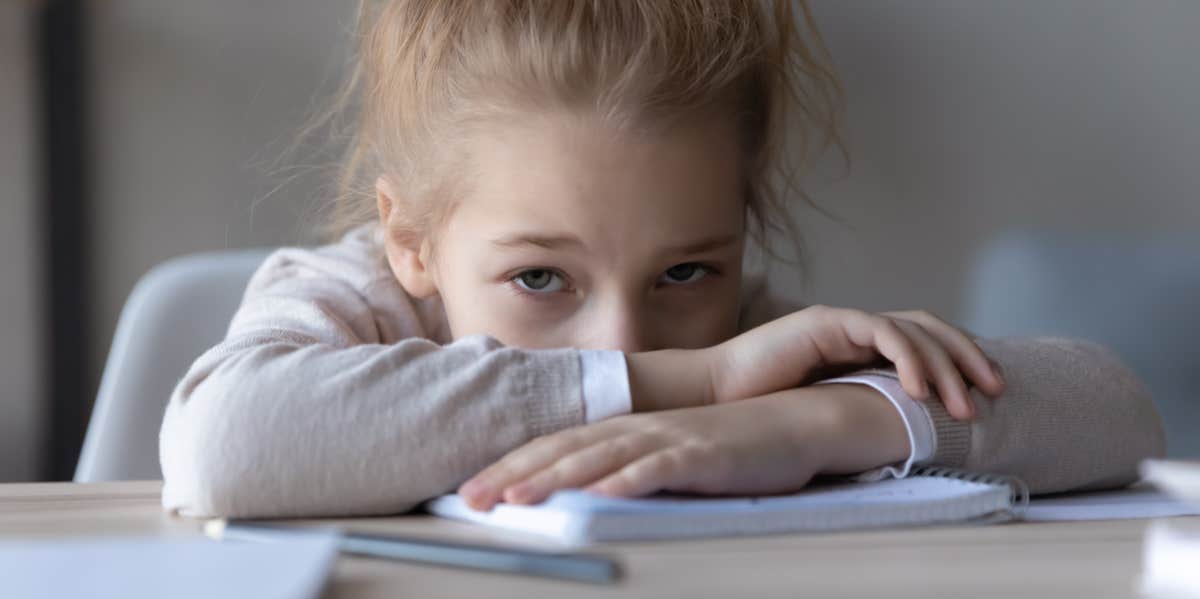Pandemic Schooling Broke My Autistic Daughter
She deserves better.
 fizkes / Shutterstock
fizkes / Shutterstock I am looking at the second-semester report cards for my two children.
A couple of weeks ago we learned that my son was in danger of failing math and science. His dad and I talked with him, and we formulated a plan. He worked really hard and was eventually able to ask for and accept help. My son passed both classes, no sweat, and ended up improving his overall GPA by 5 points. He has missed 4 days of school since the beginning of the year.
My daughter, who is autistic and type 1 diabetic, struggles with school on the best of days, even before the Covid pandemic. For health reasons, she cannot attend school in person and has been “learning” remotely since last March.
At the beginning of the semester, I made the decision to cut out almost all of my daughter’s academic classes. I agreed with her special education student advocate to change two classes she is taking to pass/fail.
All assignments and projects have been modified within an inch of their lives, to the point where an outsider might walk in and wonder if it was 4th grade Language Arts instead of a 10th grade English regents course.
In the only class where she was forced to take a numerical grade, she failed. She failed gym. According to the report card, my daughter has missed 41 days of schooI.
There are 180 days in the school year, which means by the end of the second marking period, the class has been in session for 90 days. That means my beautiful, smart, sassy, creative, amazing autistic daughter attended classes more times than she missed. She was “present” for 49 days.
And that is an accomplishment. She missed the majority of those days during the first semester, when the plan in place was not suitable, did not meet her needs, did not satisfy her IEP (individual Education Plan).
So I’ll be damned if I am going to look at my children’s report cards, side by side — one spouting 90s and 100s and a hard-earned 77 — the other bare and scant with the only numbers of consequence indicating her failures within the system. I’ll be damned if I look at those reports and compare them and say one is good, one is bad. One deserves praise, one will be shamed and punished.
My 14-year-old neurotypical son has adapted to remote schooling, signs on for all his classes, and mostly works independently. I casually check in with him during the week to see how it’s going, knowing all is well and under control.
My neurodiverse 16-year-old daughter must be woken up at least 90 minutes before her first class. She needs time to stretch and yawn and meander her way to the living room.
I ask her if she’s ready for breakfast. Not yet. How about now? Stop bugging me, Mom! Breakfast is finally served, she takes a finger prick of blood, adjusts her insulin, and eats. By now it’s almost time for her first class to start.
I leave my work-from-home desk and sit next to her. I turn on her chrome book, log her in, and join the first virtual meet with her teacher and aide.
I facilitate her transition into school mode. I sneak away 5, 10, 15 minutes later after I am satisfied that she is either a) engaged in the lesson, or b) not even going to give it a chance. This is every day. Every day. I create a home environment that allows her to engage, step by step. If I don’t do it, she doesn’t attend school.
So let’s get real — my daughter wasn’t absent for 41 days. I failed to help her log on for 41 days.
Because I was AT work, not working from home. Me working = no school for my daughter, because despite numerous meetings with the school, special education teacher, counselor, and head of special education department, the supports needed to launch my child from the couch to online school have NOT been put in place.
The school failed her. I failed her. But my daughter — my daughter did not fail her subjects. She was never given the opportunity to succeed. The pandemic robbed my daughter of her ability to have a meaningful academic experience.
C. Maya Ritter is professional academic editor, writer, and poet. She is an outspoken advocate for children with developmental disabilities and mental health awareness.
